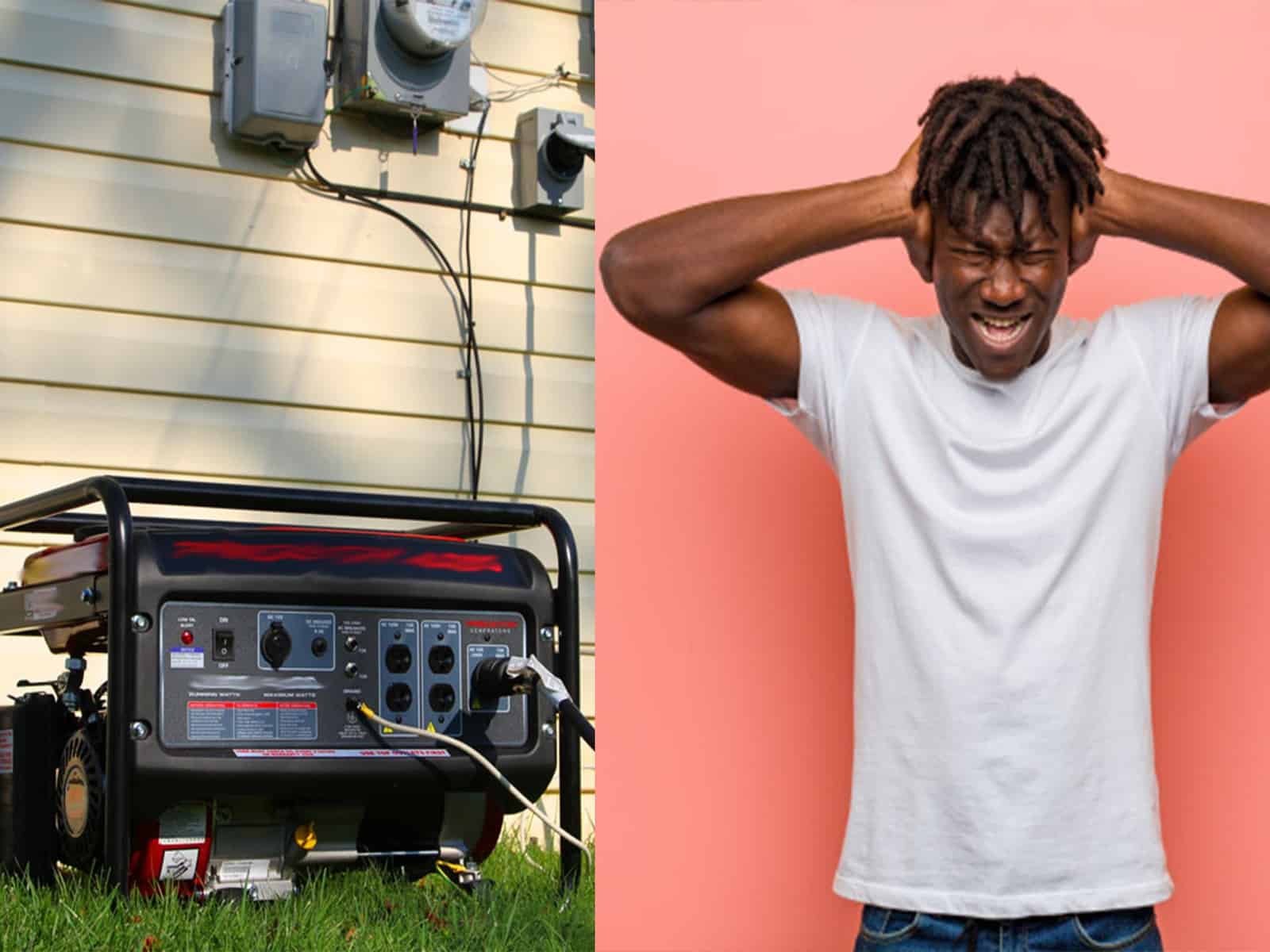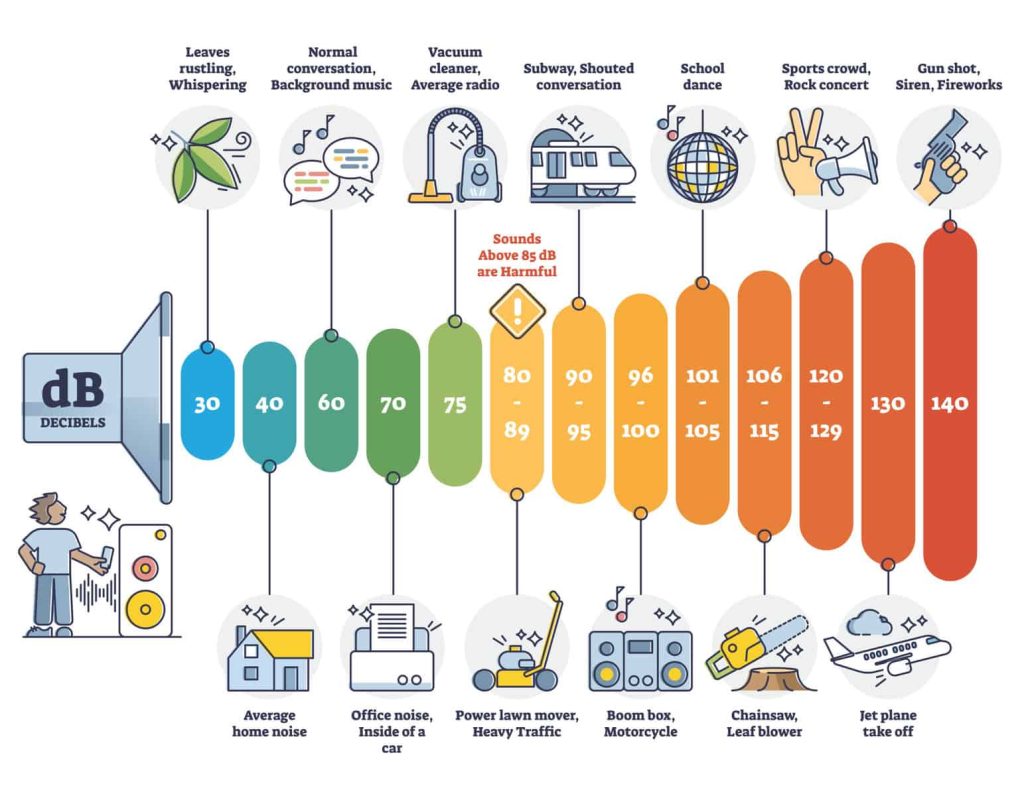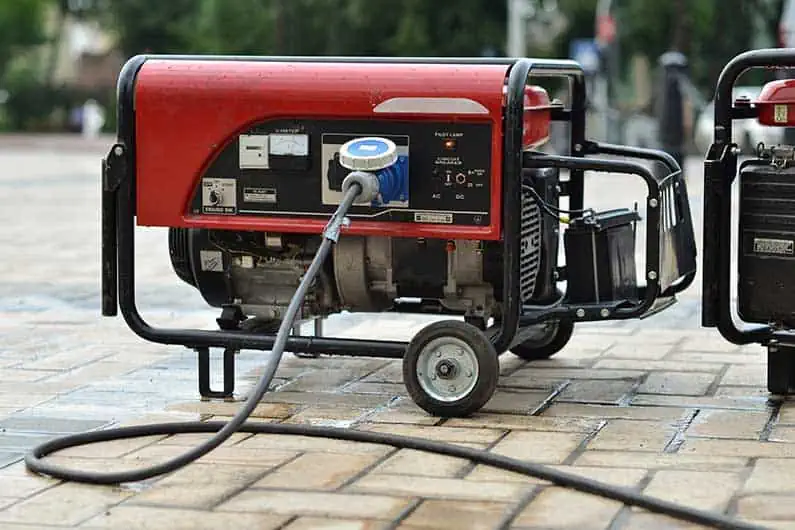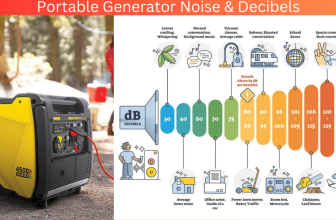
How Loud Is A Generator Key Takeaway:
- Generators are inherently noisy due to the combustion processes involved in generating electricity. Understanding decibel levels and the restrictions on noise can help you choose a generator that meets your needs while conforming to regulations and keeping the noise to a minimum.
- Most generators produce noise levels of around 70-80 decibels, which can be disruptive to your neighbors. To avoid disturbing those around you, consider purchasing a generator that is designed to be quiet, with noise levels below 60 decibels.
- When choosing a generator, consider factors such as starting wattages, running wattages, tank capacity, and max running time in addition to noise levels. The Honda inverter generator is currently the quietest generator on the market, but other models may better suit your specific needs.
Introduction
The article discusses the noise levels of generators and the reason behind their loudness. Generators are often used as a backup power source during power outages or in remote locations. However, the noise generated by these machines can be a cause of concern for many people.
The noise level of generators is measured in decibels (dB) which varies based on the size and type of the generator. In this article, we will explore the different factors contributing to the noise of generators and possible solutions.
Generators operate by converting fuel or air into mechanical energy which is then transformed into electrical energy. The process of combustion and mechanical operations contributes to the noise generated by the generator. Another factor that affects the noise level is the size of the generator. Larger generators tend to produce more noise due to higher power output. Noise reduction techniques such as sound dampening materials and enclosure systems can be used to lower the noise levels.
The article also explores common types of generators such as portable, standby, and inverters. Each type has its unique qualities that affect the noise levels. For instance, portable generators tend to be louder than standby generators due to their smaller size and portability. Inverters, on the other hand, have quiet operation due to their built-in technology that regulates power output.
Overall, it is important to consider the noise level of a generator before purchasing or using one. With the variety of options available, it is possible to choose a generator that meets the necessary power requirements and noise limitations. Choosing a quieter generator ensures comfort and peace of mind during power outages or outdoor activities.

Understanding decibel levels and how they measure sound
The science behind measuring noise levels is crucial in Understanding decibel levels and the way they evaluate sound. The decibel scale is logarithmic; thus, a small increase produces a significant rise in noise. Generators being a common source of noise, the loudness of a generator is calculated using decibels to determine how loud it is. Different generator models produce different noise levels, with some exceeding safe noise limits.
While understanding decibel levels and how they measure sound is essential, it’s also important to note that other factors, such as physical barriers, affect sound transmission. Moreover, maintenance can affect noise levels, with improperly maintained generators being noisier than well-maintained ones.
Interestingly, measuring noise levels has been a topic of interest since the 1920s, culminating in the creation of the decibel scale, which became widely accepted as a standard for noise measurement. Since then, the measurements have improved, and sound meters have been developed to track the noise level accurately.
What is a loud generator?
A loud generator refers to a generator that produces high levels of noise during operation. Generators emit noise as a result of the internal combustion engines that power them. The noise level of a generator is expressed in decibels (dB). The higher the dB level, the more noise a generator produces. This noise pollution poses a significant problem, especially in residential areas, where the sound can disturb the peace and quiet of the environment.
To mitigate the noise produced by generators, manufacturers often provide soundproofing measures such as mufflers and enclosures. These mechanisms help to reduce the noise level produced by the generator. However, it’s essential to note that the larger the generator’s capacity, the more noise it’s likely to produce. A generator’s noise level can also vary based on its make and model, among other factors.
It’s crucial to understand that prolonged exposure to high levels of generator noise can cause hearing damage. This means that it’s essential to take precautions such as wearing earplugs or earmuffs when operating or being in close proximity to generators. Similarly, when purchasing a generator, it’s crucial to consider noise levels as a factor in decision-making to mitigate the risk of noise pollution.
History shows that generator noise has been a problem since the invention of the first generator in the 1820s. Although the technology has advanced over the years, the problem of generator noise remains a significant concern. As the world continues to transition to clean energy, it’s exciting to see innovations in quieter generators such as solar-powered and hybrid generators.

What is a quiet generator?
A quiet generator is an alternative power source that produces minimal sound emissions during operation. These generators are designed with noise-reducing features that dampen the sound produced by the engine and other moving parts. The quieter the generator, the less disruptive it is to the surrounding environment.
With advancements in technology, manufacturers have been able to produce generators that operate at a noise level of 50 decibels or less, which is comparable to the sound level of a normal conversation. This makes quiet generators ideal for use in residential areas, camping sites, and other noise-sensitive environments.
When considering a quiet generator, it is important to look at the decibel level produced by the generator. The higher the decibel level, the louder the generator will be. A quiet generator will typically have a decibel level below 60, while a standard generator can have a decibel level of 80 or higher. In addition to the decibel level, it is also important to consider the size and output of the generator. A smaller generator may be quieter, but it may not provide enough power for your needs.
It is worth noting that generator noise can be harmful to both humans and animals. Prolonged exposure to loud generator noise can cause hearing damage, stress, and other health issues. In response to this, there have been noise regulations put in place to encourage manufacturers to produce quieter generators.
A true history about quiet generators is that they were initially designed for military use. In the 1960s, the US military developed quiet generators to power communication equipment in remote locations without alerting the enemy. These early generators were large and expensive, but they paved the way for the development of smaller, more efficient, and quieter generators that are widely available today.
The 5 quietest generators currently on the market
The top 5 least noisy generators available in the market are highly sought-after, especially when it comes to outdoor activities like camping and tailgating. As noise pollution is becoming more widespread, people are turning to quiet generators to reduce noise disturbance. These generators also come in different sizes and capacities, so buyers should choose one that fits their specific needs.
Here are the 5 quietest generators currently on the market:
- Yamaha EF2200iS
- Honda EU2200i
- WEN 56380i Super Quiet 3800 Watt
- Briggs & Stratton P4500 Power Smart Series
- Champion 3400-Watt Dual Fuel RV Ready Portable Inverter Generator
One unique aspect of these generators is that they can run more than 8 hours at a stretch at 25% load capacity. They also have a decibel rating that ranges from 52 dB to 59 dB, which is quieter than the noise level of an average conversation. These generators are perfect for campsites, RVs, and outdoor activities.
To keep these generators operating with minimal noise, regular maintenance is essential. Clean air filters, oil changes, and spark plugs help keep the engine running smoothly. Additionally, ensuring that the generator is placed on level ground and using a sound barrier like a wall or a noise-reducing enclosure also contributes to reducing noise pollution.
Buying a quiet generator can be an investment, but it is worth every penny, especially for those who enjoy spending time outdoors. The 5 quietest generators currently on the market provide dependable and quiet power when needed, and with proper maintenance, they can last for years to come.
Parameters to consider when choosing a quiet generator
When selecting a quiet generator, there are key factors to keep in mind to help make an informed decision. The following are essential parameters to consider.
- Noise Level: Choose a generator that falls within the acceptable noise level range and has a decibel rating that is appropriate for your environment.
- Wattage: Determine the wattage requirements for your needs to ensure that the generator can deliver enough power, but not more than necessary.
- Fuel Efficiency: Consider fuel consumption as generators that consume less fuel tend to be quieter.
- Size and Portability: If you need to frequently move the generator, consider a smaller and easily transportable model, but ensure it can still meet your wattage requirements.
It’s also important to note that some generators are designed to be quieter than others due to superior sound insulation and innovative exhaust systems. Acquiring a generator with these features can help to reduce noise levels. Lastly, implementing measures such as placing the generator on soft ground or placing sound-absorbing materials around can also help to minimize noise levels.
Conclusion
The Effect of Generator Noise on dB Levels: Key Insights
Finding a generator that produces minimum noise levels is essential to avoid causing a disturbance to yourself and your neighbors. Most generators produce noise levels ranging between 60 and 80 decibels, depending on the brand and model. However, there are other factors to consider, such as the generator size, location, and time of use.
To minimize the noise produced by a generator, some practical tips include:
- Installing a muffler or silencer
- Positioning the generator away from living areas
- Operating it during reasonable hours
It’s also important to note that larger generators typically produce more noise than smaller ones.
Pro Tip: Always prioritize a generator’s noise level as a key consideration when purchasing a new one. It’s worth investing in a quieter model to avoid causing disturbance to yourself or your loved ones.
Five Facts About How Loud Is A Generator: Why Are They So Noisy & DB Level:
- ✅ Generators can produce more than 75 decibels (dB) of noise even when operating at 25% load. (Source: Team Research)
- ✅ Generators that produce less than 60 dB noise levels are considered ‘quiet generators’. (Source: Team Research)
- ✅ Some cities and homeowner’s associations (HOA) have a policy that home generators should be kept below 75 decibels, or risk a fine. (Source: Team Research)
- ✅ A general rule for camping sites is that generators should not produce noise levels in excess of 65 dB. (Source: Team Research)
- ✅ The Honda inverter generator is the quietest generator on the market. (Source: Team Research)
FAQs about How Loud Is A Generator: Why Are They So Noisy & Db Level
How loud are power generators?
Power generators can be very loud. Even when operating at 25% load, bigger 10,000W+ generators can produce more than 75 dB of noise (measured at 23 ft distance).
What is considered a quiet generator?
Generators that produce less than 60 dB noise levels are considered to be ‘quiet generators’.
What are decibel restrictions for noise generation?
Some cities and homeowner’s associations (HOA) have a policy that you should keep your home generator below 75 decibels. Anything above that can result in a fine, especially if you’re running a generator for prolonged periods of time. A general rule for camping sites is that a generator should not produce noise levels in excess of 65 dB.
How can we measure the quietness/loudness of generators?
We measure the noise levels of generators from 23 feet away. A generator with 74 dB maximum noise level output will produce 74 dB only when it’s 23 feet (or 7 meters) away.
What is watts per dB?
Watts per dB is a parameter used to find the best compromise between the generator’s noise levels and power output. It compares the number of watts the generator produces with the amount of noise it generates.
What other specifications should be considered when choosing a quiet generator?
Other important specifications to consider include starting wattages, running wattages, tank capacity, max. running time, price, brand, and user reviews.



